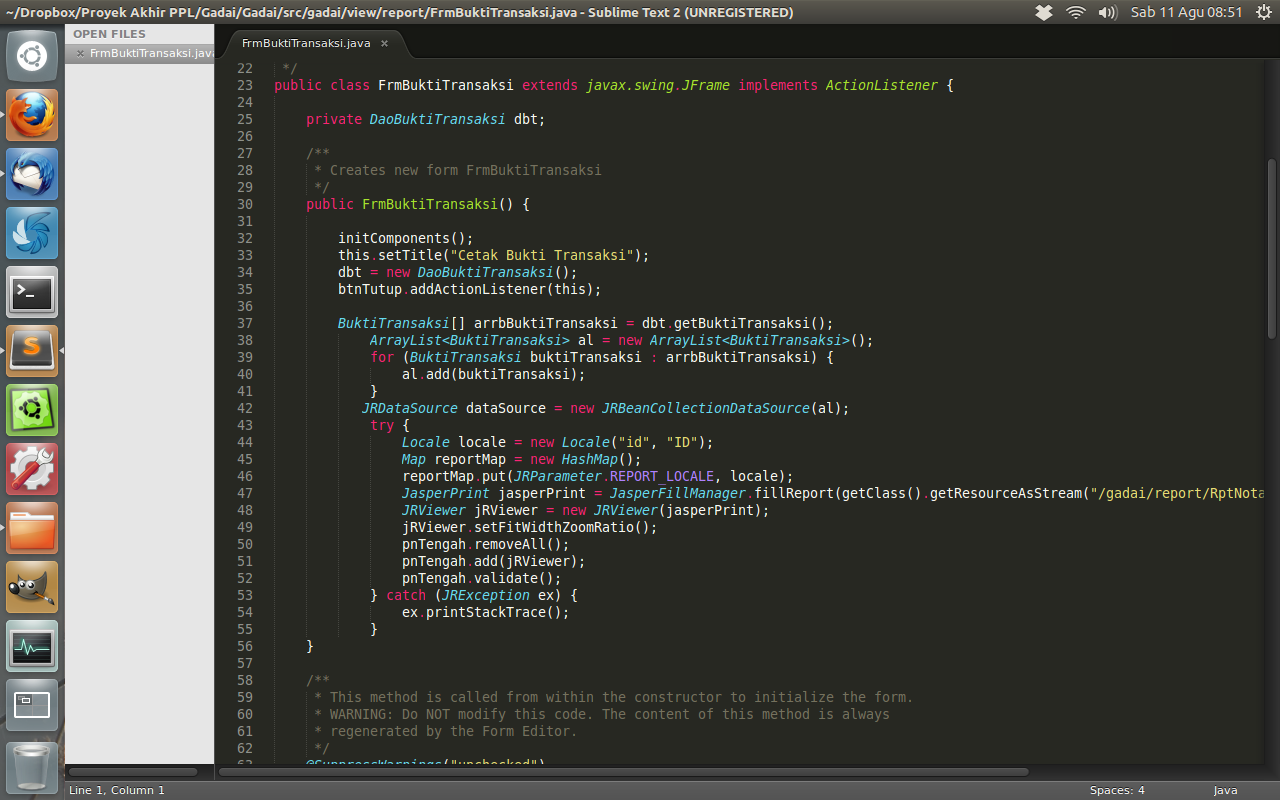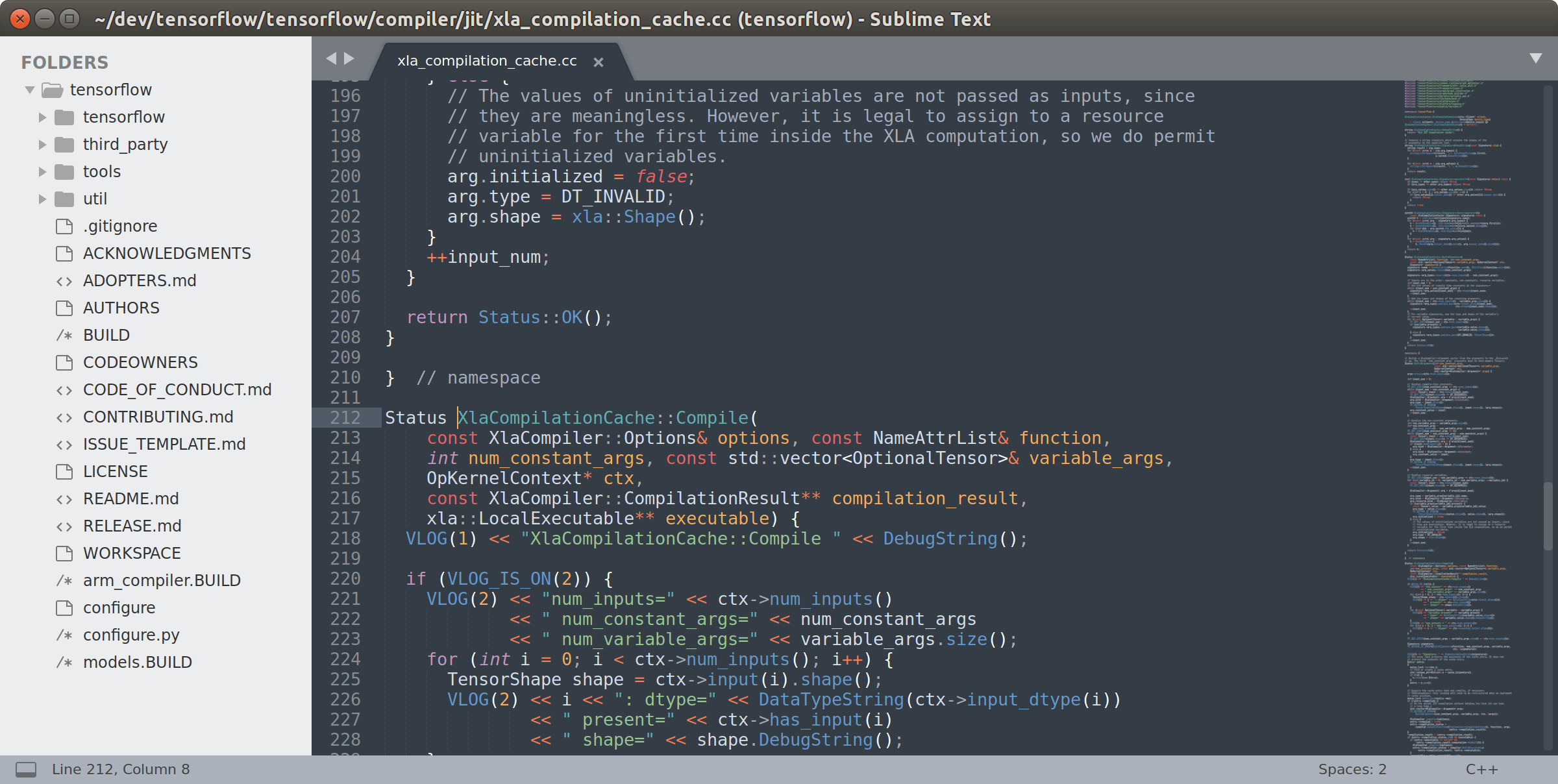Build 4113
- Improved performance when editing large files
- Improved OpenGL rendering performance
- Improved handling of deleted files
- Various syntax highlighting improvements
- subl can now be used to edit stdin, eg: echo test | subl | cat
- Syntax and indentation detection is now done when editing stdin
- Added syntax_detection_size_limit setting for controlling when syntax detection is skipped
- Theme: Improved scroll puck visibility
- Theme: Fixed adaptive theme not respecting themed_title_bar setting with light color schemes
- Middle clicking in the Open Files section of then sidebar will close the clicked on file
- Preserve Case now works with unicode characters
- Added reveal_menu setting for disabling revealing the menu when alt is pressed on Linux and Windows
- Safe Mode key binding can be disabled by creating a file named .Disable Safe Mode Shortcut in the data directory
- Fixed Ruby syntax highlighting in the Monokai color scheme
- Fixed a scenario where folders weren't being watched for changes
- Fixed underlines being drawn behind line highlight
- Fixed an infinite loop that could occur during syntax highlighting
- Fixed the append command's scroll_to_end parameter sometimes not working
- Fixed Goto Symbol sometimes being scrolled incorrectly
- Fixed multi-select file limit applying to sidebar
- Fixed auto-complete related hang in some large files
- Linux: Fixed print sometimes not working
- Linux: Fixed wrong order of yes/no buttons in GTK dialogs
- Linux: Fixed letters sometimes being cut off
- Windows: Always make a new window when launching main executable on Windows
- Windows: Fixed window icon not scaling properly on Windows
- Windows: Fixed globs not being expanded in some cases on Windows
- Mac: Fixed auto theme not changing with OS auto theme on macOS
C/C++ language servers
The below was written for clangd, but much applies to cquery and ccls as well.
Compile current file using Ninja. As a more complex plug in example, look at the attached python file: compilecurrentfile.py.This plugin will compile the current file with Ninja, so will start by making sure that all this file's project depends on has been built before, and then build only that file. Create a new build system for Sublime Text for setting up C compilation. Open Sublime Text editor and then go to Tools Build System New Build System. Paste the following code in the file and save it. Name the file as “ CP.sublime-build “. The above block of code is used for taking input from the file “inputf.in” and prints the.
CCLS
Sublime Text has a build system already built-in, but the C/C builder doesn’t work properly with MinGW out of the box. Instead, we will create a new build file that will use the MinGW-w64 compiler we installed. Compiler-specific flags. Compilecommands.json# Like any language server, clangd works on a per-file (or per-buffer) basis. But unlike most other language servers, it must also be aware of the exact compile flags that you pass to your compiler. For this reason, people.
A newer project emerged from cquery.Build and install from source, see ccls wiki
Cquery
Build and install from source, see cquery wikiNote that work on cquery has stopped. Prefer using ccls or clangd.

Clangd
To use clangd on Debian/Ubuntu, add the apt repositories described here.After that, install with e.g. apt install clang-tools-9. The clangd executablewill have a version number suffix. For instance, clangd-9. You will thus have toadjust your 'clients' dictionary in your user preferences.

To use clangd on Mac, use Homebrew: brew install llvm. The clangd executablewill be present in /usr/local/Cellar/llvm/version/binYou probably need to install the Xcode developer command-line tools. Run the following in a terminal:
And if you're on macOS 10.14, also run the following to install essential headers like wchar_t.h:
To use clangd on Windows, install LLVM with the LLVM installer,and then add C:Program FilesLLVMbin to your %PATH%.
Compilation database
For any project of non-trivial size, you probably have a build system in placeto compile your source files. The compilation command passed to your compilermight include things like:
- Include directories,
- Define directives,
- Compiler-specific flags.

compile_commands.json
Like any language server, clangd works on a per-file (or per-buffer) basis. Butunlike most other language servers, it must also be aware of the exact compileflags that you pass to your compiler. For this reason, people have come up withthe idea of a compilation database.At this time, this is just a simple JSON file that describes for eachtranslation unit (i.e. a .cpp, .c, .m or .mm file) the exactcompilation flags that you pass to your compiler.


It's pretty much standardized that this file should be calledcompile_commands.json. clangd searches for this file up in parentdirectories from the currently active document. If you don't have such a filepresent, most likely clangd will spit out nonsense errors and diagnostics aboutyour code.
As it turns out, CMake can generate this file for you if you pass it thecache variable -DCMAKE_EXPORT_COMPILE_COMMANDS=ON when invoking CMake. It willbe present in your build directory, and you can copy that file to the root ofyour project. Make sure to ignore this file in your version control system.
If you are using a make-based build system, you could use compiledbto generate a compile_commands.json.
Since header files are (usually) not passed to a compiler, they don't havecompile commands. So even with a compilation database in place, clangd willstill spit out nonsense in header files. You can try to remedy this byenhancing your compilation database with your header files using this project called compdb.
Sublime Text C++ Debug
To generate headers with compdb, read this closed issue.
You can also read about attempts to address this on the CMake issue tracker, along with the problemof treating header files as translation units.
compile_flags.txt
Sublime Text C++ Compiler
Another way to let your language server know what the include dirs are is by hand-writing a compile_flags.txt file inyour source root. Each line is one flag. This can be useful for projects that e.g. only have a Visual Studio solutionfile. For more information, see these instructions. Creating this file by hand is a reasonable place to start if your project is quitesimple.